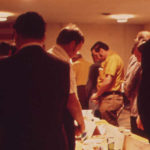We run our website the way we wished the whole internet worked: we provide high quality original content with no ads. We are funded solely by your direct support. Please consider supporting this project.
Prayer Matters
Jesus taught us to pray in a way that recognizes that God’s will isn’t manifested in evil; it’s manifested when he and his people revolt against it. Jesus tells us that the cry of our heart is to be for God’s kingdom to come and his will to be done “on earth as it is in heaven” (Mt 6:10). This is actually a single request. For God’s Kingdom is for God’s will to be done. As the English word indicates, a “Kingdom” is simply a “domain” in which someone is “king”: literally, a King’s Dome. God’s Kingdom, therefore, is the domain in which his will is being done “on earth as it is in heaven.”
Preserving this earth as the Kingdom of God was humanity’s original mandate. As a race and individually, we blew it. But now, through the work of Christ and the ongoing operation of the Holy Spirit, God is reinstating humans who align themselves with Christ to reclaim this planet and their rightful place as God’s viceroys on it. Advancing the domain of God’s reign is thus what followers of Jesus are to live for.
Yet, how can a person live to bring about God’s will on earth as it is in heaven if they are convinced—as many are today—that everything already reflects God’s will on earth as it is in heaven? A great deal hangs on how we understand God’s involvement with evil in the world. Those who pray for the kingdom to come believe that something is wrong. I suspect that one of the reasons many who profess faith in Christ continue in the convenience of normal living and its nice, safe, innocuous and impotent religion is because they aren’t convinced anything is really wrong. Sure, they may theoretically believe in Satan, but he’s “on God’s leash,” as some say. And they take this to mean that everything Satan does ultimately fits into God’s plan.
The Lord’s prayer presupposes that God’s will is not yet being perfectly accomplished. And it presupposes that Jesus’ followers have been empowered to recover the original mandate to humanity and thus play a key role in bringing about God’s will – “on earth as it is in heaven.”
I know the traditional cliché that prayer is for our sake, not God’s. It changes us, not God, or God’s plans. Even C .S Lewis said that! Now, I have the greatest admiration for Lewis. But on this account, I think he is dead wrong.
Prayer does certainly change us, but that’s not why we’re told to engage in it. We’re commanded to engage in prayer because it is a God-ordained means of impacting him and changing the world. Jesus didn’t say if we have faith and pray our attitude toward mountains would change. He said the mountain would move! Prayer changes what happens in world.
Prayer is the most significant activity humans can engage in. In fact, the biblical narrative is significantly woven around God moving in response to prayer. From Cain’s plea for leniency (Gen. 4:13–15) to the Israelites cry for freedom (Exod. 2:23–25; 3:7–10; Acts 7:34); from Moses’ cry for help at the Red Sea and against the Amalakites (Exod. 14:15–16; 17:8–14) to Hezekiah’s prayer for an extension of life (2 Kings 20:1–7); and from Abraham’s prayer for a son (Gen. 15:2ff) to the leper’s prayer to Jesus for healing (Matt. 8:2–3), the biblical narrative is woven together by examples of God moving in extraordinary ways in response to the prayers of his people.
John Wesley was only slightly overstating the matter when he taught, “God will do nothing but in answer to prayer.” At the very least, the extent to which Gods’ will is done “on earth as it is in heaven” depends more on prayer than on any other human activity. As the Lord’s brother put it, prayer is powerful and effective (James 5:16) – not just in changing us, but in saving nations and in bringing about the Kingdom.
Category: General
Tags: God's Will, Kingdom Living, Prayer
Topics: Hearing God, Prayer, Spiritual Warfare, Cosmic Conflict
Related Reading

The Kingdom of God ≠ Political Activism
Given the centrality of following Jesus’ example, it is vitally important we not only notice that Jesus was a revolutionary (see post) along with some ways that we can join his revolution (see that post here), but how he was a revolutionary. Many Christians today assume that in order to revolt against ungodly aspects of…

Podcast: If Open Theism is True, Does it Make Sense to Pray For Intercession?
Greg talks about prayer and freedom. Specifically, if free will is so important, why would God override it in answer to prayer? http://traffic.libsyn.com/askgregboyd/Episode_0123.mp3

Why Is It So Much Easier For Jesus To Perform Miracles When He Said We Would Do Even Greater Things? (podcast)
In this episode Greg discusses the miracles of Jesus, particularly looking at why we struggle to perform them. Episode 27 http://traffic.libsyn.com/askgregboyd/Episode_0027.mp3

7 Ways to Join the Kingdom Revolution
In the previous post, I introduced in short form the call to participate in the kingdom revolution that Jesus began. What does this mean for us today? Let me offer seven ways we are called to the Jesus revolution: When Jesus set aside the riches of his divine prerogatives and sided with the poor and…

Bowing to the American Flag. Literally.
Kurt Willems shared this interesting item he found on Amazon. In the product description it admonishes us to: Submit yourself to the Prayer Bench and open up your life to receive more of God. Hmmmmmm. How about we just submit ourselves to God?

What the hell are we doing here?
Meet Collin Simula. He lives in Columbus, Ohio, and is a part of Central Vineyard church. He is a 30-year-old graphic designer, and a happily married father of three. Collin has spent his whole life in the Church, in every denomination imaginable, from Calvinist/Christian Reformed churches, to a Baptist high school, being a part of…

